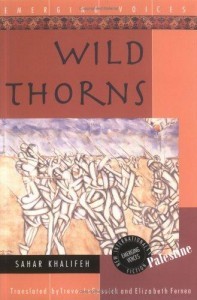Biography
Much postcolonial fiction available to English-speaking readers is written by native historical witnesses; that is to say, the author has lived through what s/he writes, or is inspired by events and circumstances occurring in the country of his/her origin. Sahar Khalifeh, a Palestinian from Nablus, a town in the Israeli-occupied West Bank, is no exception to this trend. Khalifeh was born during the British mandate over Palestine, in 1941. She married at the age of eighteen and divorced thirteen years later, leaving a frustrating marriage for an American education in literature and women’s studies. Her first novel was confiscated by the Israelis, while the second was first published in Cairo. She has taught at the University of Iowa and Bir Zeit University, the premier institution of Palestinian higher education. She founded the Women’s Affairs Center in Nablus, with additional branches in Gaza City and Amman.
Wild Thorns and the Representation of the Individual Agent

Khalifeh’s writing intersects and elaborates upon issues of feminism, postcolonial oppression, life under occupation, and the position of the individual. In Wild Thorns, Khalifeh illustrates the varying responses to Israeli occupation sustained by Palestinians: “surviving” complacently under colonial constraints is contrasted with and informs the insistence on militancy as a necessary venue of resistance. The condition of diaspora is never a totalizing structure for Khalifeh, who crafts each character as a subjective prism. The individual as historical agent is always legible in Wild Thorns. Whether in the example of the underground, militant high schoolers, the shopkeeper who sells groceries to Israeli soldiers, or the village mothers who ululate in solidarity and protest while occupiers bulldoze their homes, Khalifeh allows the reader to hear a chorus of voices in the cacaphony of occupation. Her own biography proves her a powerful agent in the trajectory of Palestinian history, bridging the individual with the collective, and the subjective with the historical (see Women, Islam, the Hijab, Nationalism, Representation).
Novels
Khalifeh’s books include We Are Not Your Slave Girls Anymore (1974), which was serialized and made into a radio program, Wild Thorns (1975), her most acclaimed novel, (English translation by Al-Saqi books, 1985), The Sunflower (1980), Memoirs of an Unrealistic Woman (1986), a novel about a woman caught in a loveless marriage, The Door of the Courtyard(1990), The Inheritance (1997), The Icon (2002), Hot Spring (2004), and Roots and Branches (2009). Khalifeh is the most celebrated Palestinian novelist; her works have been translated into a variety of languages, including Hebrew, Dutch, Russian, Swedish, and English.
Related Topics and Links
- Only known English-language interview with author: Nazareth, Peter.”An Interview with Sahar Khalifeh,” Iowa Review 11.1(1980): 67-86.
- Online Resource for Palestinian Culture (includes bibliographies and biographies of authors, including Khalifeh): Bailasan Co. (January1997). Khalil Sakakini Cultural Center. 18 April1998. Web. <http://www.sakakini.org>
- Arab World Books
http://www.arabworldbooks.com/authors/sahar_khalifa.html
A Selected Bibliography of Works by Arab Women Writers
I. Secondary/Critical Texts
- Badran, Margot. Feminists, Islam and Nation. Princeton: Princeton University Press, 1995.
- Badran, Margot and Cooke, Miriam. Opening the Gates. Bloomington: Indiana University Press, 1990.
- Woodhull, Winifred. Transfigurations of the Maghreb. Minneapolis: University of Minnesota Press, 1993.
- Ahmed, Leila. Women and Gender in Islam. New Haven: Yale University Press, 1992.
- Baron, Beth. The Women’s Awakening in Egypt. New Haven: Yale University Press, 1997.
- Malti-Douglas, Fedwa. Woman’s Body, Woman’s World. Princeton: Princeton University Press, 1991.
II. Primary Texts (Fiction)
- Rifaat, Alifa. Distant View of a Minaret. Portsmouth, NH: Heinemann, 1987.
- Djebar, Asia. Fantasia. Portsmouth, NH: Heinemann, 1993.
- Soueif, Ahdaf. In the Eye of the Sun. New York: Anchor Books, 1992.
- Tuqan, Fadwa. Mountain Journey. Saint Paul: Graywold Press, 1990.
- al-Shaykh, Hanaan. The Story of Zahra, Women of Sand and Myrrh. New York: Anchor Books, 1992.
- Khalifeh, Sahar. Wild Thorns. New York: Interlink Books, 2000.
- el-Saadawi, Nawaal. Woman at Point Zero. London: Zed Books, 1983.
- Abouzeid, Leila. Year of the Elephant. Austin: University of Texas Press, 1989.
III. Auto/biography
- Shaarawi, Huda. Harem-Years. New York: The Feminist Press, 1987.
- Ashrawi, Hanan. This Side of Peace. New York: Touchstone, 1995.
IV. Folklore
- Bushnaq, Inea. Arabic Folktales. New York: Pantheon, 1987.
- Booth, Marilyn. My Grandmother’s Cactus. Austin: University of Texas Press, 1993.
- Muhawi, Ibrahim and Kanaana, Sharif. Speak, Bird, Speak and Speak Again. Berkeley: University of California Press, 1989.
- Bakr, Salwa. The Wiles of Men. Austin: University of Texas Press, 1993.
Citation
- Khalifeh, Sahar. Wild Thorns, trans. By Trevor LeGassick and Elizabeth Fernea. Worcester, UK: Al-Saqi Books, 1976.
Author: Nader Khalaf Uthman, Spring 1998
Last updated May 2017